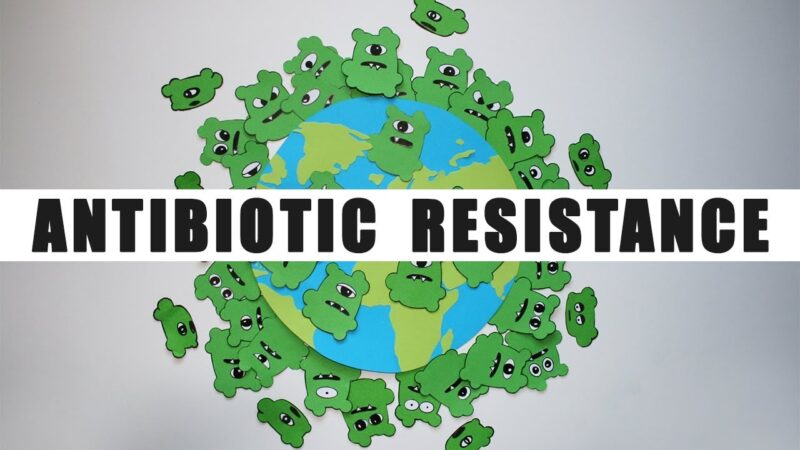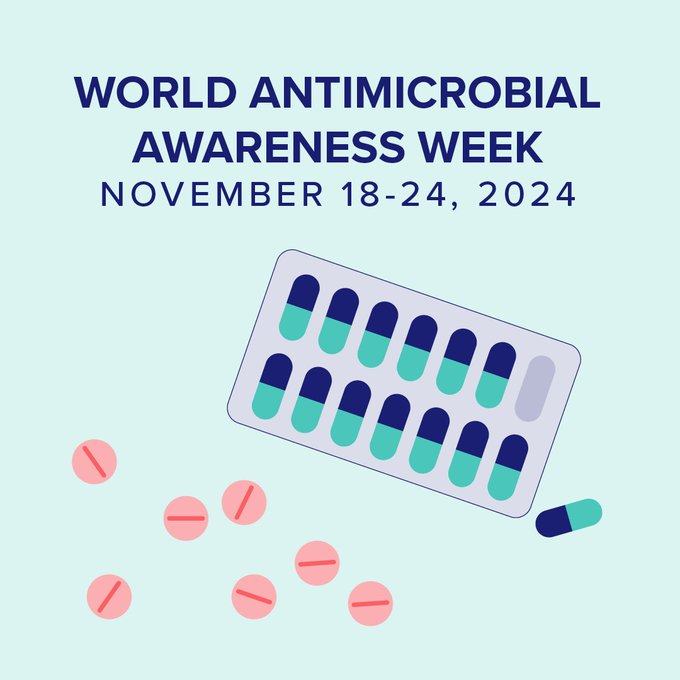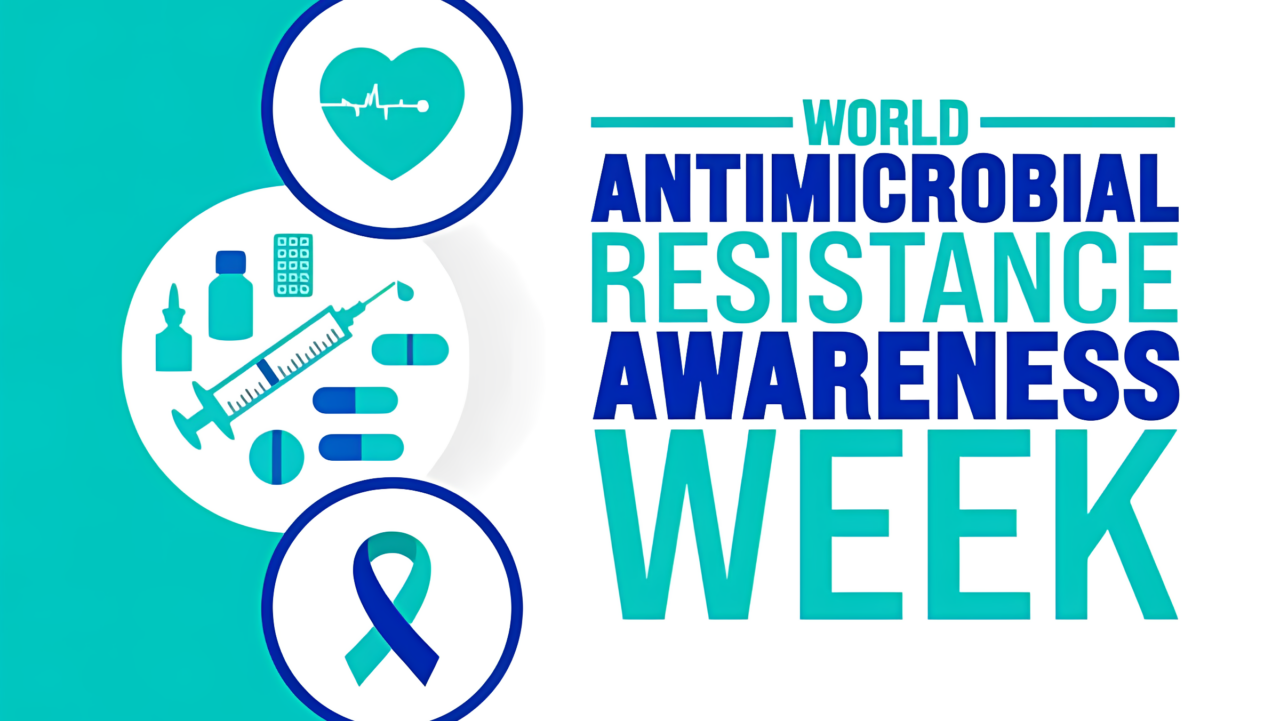World Antimicrobial Awareness Week (WAAW), held from November 18-24, emphasized the theme “Educate. Advocate. Act now” to combat antimicrobial resistance (AMR).
It served as an important opportunity to highlight the impact of AMR on cancer treatment. For this occasion, UICC has gathered a variety of resources and educational materials to raise awareness about the threats posed by AMR to cancer care and patients’ quality of life.
Without access to effective antimicrobials such as antibiotics and antifungals, the risks for people living with cancer increase significantly. These risks include delayed treatment, higher healthcare costs, medical complications like sepsis, and even death.
The Union for International Cancer Control (UICC), through its advocacy, partnerships, and guidance from the AMR Task Force, has continuously raised awareness about the intersection of antimicrobial resistance (AMR) and cancer. UICC has praised the political declaration made at the recent United Nations High-Level Meeting on AMR as a significant step in integrating AMR strategies into cancer control efforts, recognizing the necessity of coordinated global responses to protect patients and improve treatment outcomes.
These materials include an explanatory video, social media cards, Virtual Dialogues, articles, infographics, and podcasts with field experts. They aim to support UICC members, healthcare providers, policymakers, and the public in understanding the crucial role of antibiotics, antifungals, and other antimicrobials in cancer care, and the urgent need to preserve their effectiveness.
Real-Life Testimonies
UICC has gathered a collection of real-life testimonies on its dedicated webpage, featuring both videos and written posts. These personal stories highlight the challenges faced by cancer patients who develop drug-resistant infections. They demonstrate how these infections can lead to prolonged hospital stays, delays in cancer treatment, and significant emotional and financial burdens on patients and their families—particularly in regions with limited access to newer medications and specialized care.
These testimonies also emphasize the overwhelming pressure that the dual diagnosis of cancer and a drug-resistant infection places on healthcare systems, which are often already stretched thin due to limited resources and the high cost of care.
However, amidst these challenges, the testimonies also share stories of resilience and hope, showcasing the positive impact of innovative treatments. These personal accounts underscore the critical need for global action to improve healthcare, preserve the effectiveness of antimicrobials, and address the growing threat of antimicrobial resistance.
A One Health Approach and the Need for Effective Antimicrobial Stewardship
AMR is a global issue that requires a coordinated response across multiple sectors, not just human health. The World AMR Awareness Week emphasizes the need for a One Health approach, which includes addressing antimicrobial use in human health, animal agriculture, and the environment.
Improper use of antibiotics in humans, such as treating viral infections or incorrect dosing, accelerates resistance. In agriculture, antibiotics are sometimes misused in livestock as growth promoters, leading to resistant bacteria that can spread to humans. Additionally, antimicrobials can pollute ecosystems, promoting resistance in the environment.
Effective antimicrobial stewardship ensures antibiotics are used responsibly to preserve their effectiveness. In cancer care, collaboration among oncologists, infectious disease specialists, and pharmacists is crucial to prevent infections and maintain the effectiveness of treatments.
UICC supports these efforts by advocating for stewardship policies and providing resources to healthcare systems globally.
About Antimicrobial Resistance (AMR)
Antimicrobial resistance (AMR) occurs when microbes, such as bacteria, viruses, fungi, and protozoa, evolve to resist the effects of drugs designed to treat infections. This resistance complicates infection management and threatens healthcare worldwide. Misuse of antimicrobials, including overuse in medicine and agriculture, is a primary driver, though resistance can also arise naturally through genetic mutations.
Multidrug-resistant (MDR) microbes, often referred to as “superbugs,” pose a particularly serious risk. Antibiotic resistance, a subset of AMR, enables bacteria to survive treatments, leading to more difficult and costly infections to manage. Resistance develops through genetic mutations, horizontal gene transfer, and increased selective pressure from overuse of antibiotics.
AMR contributes to nearly 5 million deaths annually, with infected individuals requiring more expensive and potentially more harmful treatments. The World Health Organization (WHO) considers AMR one of the top global public health threats, responsible for over 1 million deaths in 2019 alone. Without intervention, AMR could cause up to 10 million deaths annually by 2050.
Efforts to combat AMR include promoting proper antibiotic use, improving hygiene, and investing in research. However, the COVID-19 pandemic has diverted attention and resources, worsening the challenge. Global initiatives, including international treaties, aim to reduce misuse, fund research, and improve antimicrobial access, especially in developing countries.
AMR is not just a human health issue; it involves the use of antibiotics in animals and the environment, where overuse also accelerates resistance. Effective stewardship and collaboration across sectors are essential to curb the growing AMR crisis.
Key Definitions:
- Antimicrobial resistance (AMR): Resistance of microbes to drugs that were once effective against them.
- Antibiotic resistance: A subset of AMR specifically involving bacteria and antibiotics.
- Multidrug-resistant (MDR): Microbes resistant to multiple drugs, often referred to as “superbugs.”
The WHO highlights that antimicrobial resistance is a major challenge that requires global action to prevent further spread and protect health systems from its devastating impact.

About World Antimicrobial Resistance Awareness Week (WAAW)
World Antimicrobial Resistance Awareness Week (WAAW) 2024, held from November 18-24, aims to unite global efforts to address the escalating threat of antimicrobial resistance (AMR). AMR occurs when bacteria, viruses, fungi, and parasites no longer respond to treatments, making infections harder or impossible to treat.
The 2024 theme, “Educate. Advocate. Act now,” calls for urgent action to combat AMR through education, advocacy, and effective measures. Led by the Food and Agriculture Organization (FAO), United Nations Environment Programme (UNEP), World Health Organization (WHO), and World Organisation for Animal Health (WOAH), this year’s campaign highlights the importance of Water, Sanitation, and Hygiene (WASH) in preventing infections and reducing the need for antibiotics, ultimately limiting the spread of resistant bacteria.
In June 2024, WHO and UNICEF launched a Global Framework for Action for 2024-2030 to improve WASH, health care waste management, and reliable electricity in healthcare facilities, aiming to make these services available globally. A High-Level Meeting on AMR at the UN General Assembly on September 26, 2024, revealed that over 1 billion people still lack access to basic WASH and electricity in health facilities, impeding progress in fighting AMR.
WAAW 2024 underscores the urgent need for global collaboration, ensuring safe healthcare environments and reducing AMR’s impact on public health.

For more information, visit oncodaily.com.


